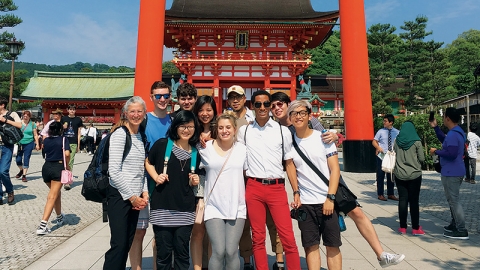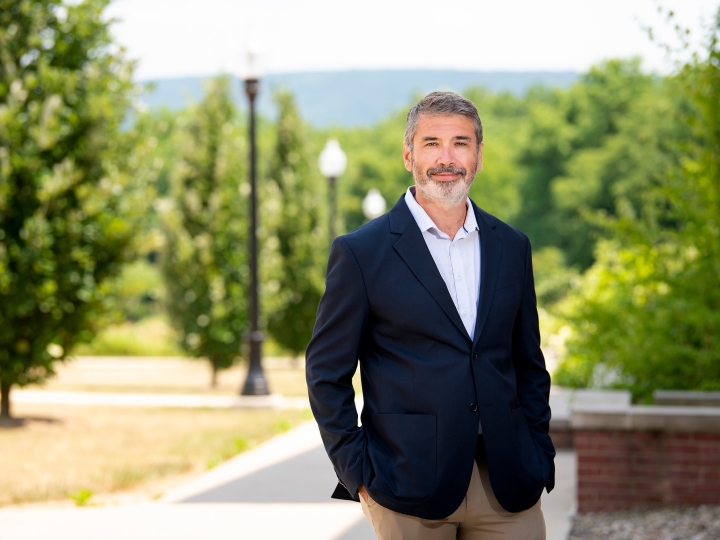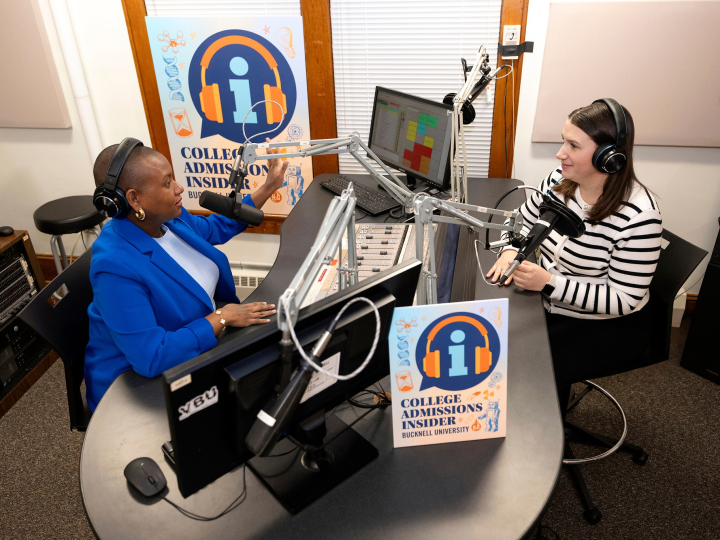
A World of Possibilities
January 12, 2017
Nathand Carter ’19 (in red pants) with the Bucknell group in Kyoto, Japan.
Access to off-campus study programs bolstered by scholarship funds
Off-campus study and global learning opportunities, such as service-learning trips, are often life-changing experiences for students. Traveling to new locales exposes students to different cultures, foods, languages, customs and ways of thinking, helping to reshape their perspectives about a host country, as well as casting a new light on their own lives.
One Bucknell student who clearly benefited from the opportunity is Nathand Carter '19, who attended a summer travel course in Kyoto, Japan, thanks to an East Asian studies scholarship.
Carter, a Los Angeles native, has had a passion for discovering cultures different from his own since he visited Ecuador as a high-school junior. Whether he's crossing the United States to attend Bucknell, exploring New York City or interviewing residents on the streets of Kyoto as he did last May, Carter is happiest in uncomfortable and unfamiliar surroundings.
"It was definitely worth it," Carter says. "There are so many different experiences that you can imagine and conceptualize in the abstract, but you really only solidify your understanding of them by doing and being in a different place. I really wish all Bucknell students could go and experience the same thing."
After a one-week crash course on contemporary Japanese culture and environmental sustainability, Carter and seven other Bucknell students spent two weeks exploring Kyoto and Hiroshima. Paired with conversation partners from Doshisha University, they visited cultural and historic sites, spoke with environmental conservationists and interviewed people they met on the street.
Students at Bucknell, and nationwide, are taking advantage of overseas study in record numbers. More than 300,000 students participated in a study-abroad experience in 2013-14, an increase of 5 percent over the previous year, according to the 2015 Open Doors Report on International Educational Exchange. Nationally, about 10 percent of students participate in a study-abroad program before graduation, a figure that has tripled in the past two decades.
At Bucknell, about 45 percent of students study abroad, according to figures from the Office of Global & Off-campus Education. And, through the WE DO Campaign, the University has been striving to make global opportunities possible for more students who otherwise wouldn't have the means, raising more than $2 million so far.
Steve '85 and Lana Franks Harber '85, for instance, fund an annual East Asian studies scholarship, while an endowed gift from Donald '77 and Pamela Heller Shassian '78, via the Shassian Family Fund for International Service Learning, enables need-based support for service-learning courses in Cape Town, South Africa, and Ciudad Sandino, near Managua, Nicaragua.
"We want to ensure that financial access is never the stumbling block for a student who wants to go abroad," says Provost Barbara Altmann. She notes that her own study-abroad experience helped her understand French and European history in a way that otherwise would not have been possible. "It's critical that there be equitable access for all of our students for programs of this kind," she says.
Depending on the destination, a three-week course, such as the trip to Kyoto that Carter participated in last year, could require nearly $6,500 per student beyond tuition for travel, course fees, food and lodging. Summer travel courses could approach $9,000 in costs.
"Trips like these can be prohibit-ively expensive," says Professor Elizabeth Armstrong, East Asian studies, who co-led the Kyoto trip with Professor Mizuki Takahashi, biology.
"I'm delighted to say that donations from our generous donors were tagged for students who specifically applied for summer programs, and we were able to give funding to five of the eight students," Armstrong says. "Somebody went out of their way to subsidize their learning activities. And students took it seriously and made the best use of the funds. The experience gave them fulfillment not only as students but also as human beings."
Funding global study for all students through generous donations is about fairness, says Professor Paul Susman, geography and Latin American studies, who has led a three-week summer service-learning course to Nicaragua seven times since 2005. "All Bucknell students should have the same range of experience available to them. It's the best teaching and learning environment I've ever been in. We shouldn't limit the opportunities to take advantage of a Bucknell education and its fullness."
Scholarship support has helped to open access to the Nicaragua service-learning course. Previously offered every other year, the course has been offered annually since 2013, and more than one-third of participants in the 2016 trip (six of 17) were students who may not have been able to go without financial assistance.
Increasing funding for student study abroad "is absolutely one of my priorities," Altmann says. "It is one of the most important forms of support for students right now. When donors have the far-sighted understanding to give more for study abroad, it's really a great way of asking students to pay it forward. They will discover for themselves the invaluable lessons they will garner from being off campus, and they are more likely to be willing to support future generations in turn. It will perpetuate itself once students understand how transformative the experience is."

